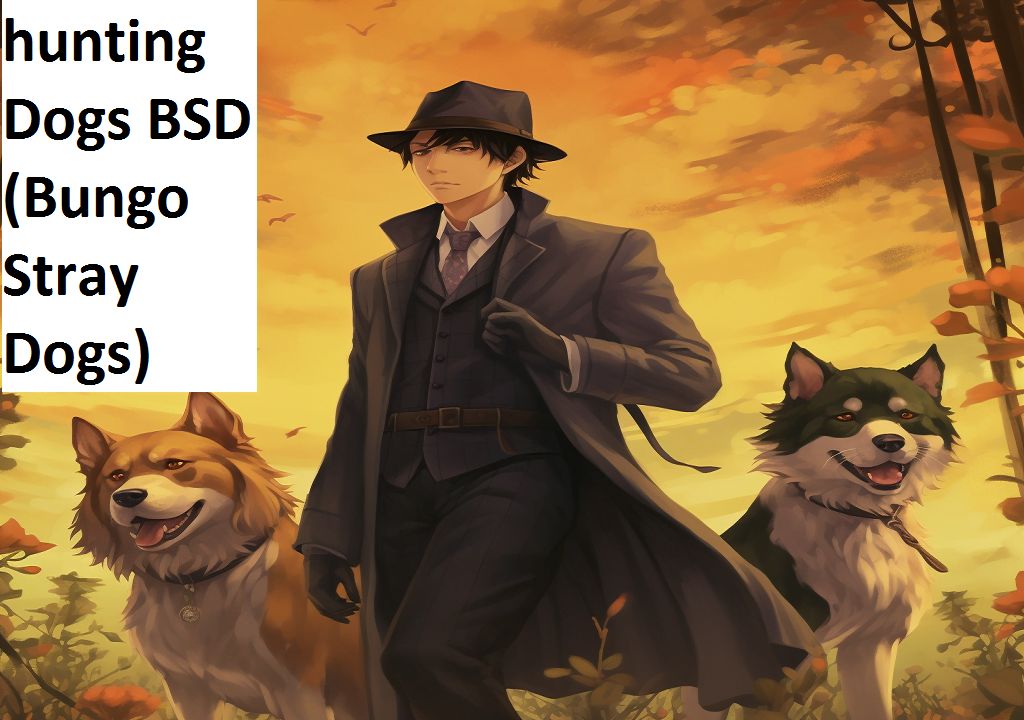Hunting dogs BSD: Unleashing the Hunt with Literary Canines

Table of Contents
- Table of contents
- Introduction: A Literary Symphony of Canine Abilities
- A Literary Reimagining
- Power of the Dogs
- Atsushi Nakajima: A Tiger’s Roar
- Osamu Dazai: Beneath the Moonlight
- Ryuunosuke Akutagawa: Rashomon’s Wrath
- Literary Showdowns
- Organizations and Ideals
- Humanity and the Supernatural
- The Power of Literature
- Literary Legacy
- Conclusion: Pages of Power and Intrigue
- FAQs (Frequently Asked Questions)
Table of contents
Introduction: A Literary Symphony of Canine Abilities
Imagine a world where characters from classic literature come to life as supernatural beings with incredible powers. Enter the universe of “Bungo Stray Dogs” (BSD), a Japanese anime and manga series that blends the essence of famous literary figures with the intrigue of a detective agency. Embark with us on a journey into the realm of BSD. Firstly, you’ll discover a place where the concept of hunting dogs assumes an entirely different significance. Furthermore, you’ll witness the merging of literary prowess with supernatural capabilities.
A Literary Reimagining
Hunting Dogs BSD (Bungo Stray Dogs) : Where Literature Meets Mystery
Dive in, first and foremost, to a domain where literary giants aren’t mere characters in books but are living, breathing entities with unparalleled skills. Additionally, in the BSD world, characters derive their names from renowned authors and their masterpieces, and they exhibit powers reminiscent of their literary legacies. Consequently, this exceptional fusion of literature and fantasy lays the groundwork for a complex storyline.
Power of the Dogs
The Agency’s Canine Operatives: Literary Abilities Unleashed
First, envision characters harnessing abilities as profound as the words penned by their creators; this is the essence of BSD. Furthermore, figures such as Atsushi Nakajima, Osamu Dazai, and Ryuunosuke Akutagawa don’t merely function as agents of a detective agency. Instead, they tap into supernatural powers inspired by their namesakes’ literary contributions. As a result, with skills ranging from controlling gravity to wielding darkness, these ‘hunting dogs’ emerge as a formidable force.
Atsushi Nakajima: A Tiger’s Roar
Unleashing the White Tiger: Atsushi’s Gift
Picture a white tiger prowling through the forest – that’s Atsushi Nakajima, who possesses the ability to transform into a fierce, supernatural tiger. Named after the author of “No Longer Human,” Atsushi’s transformation grants him strength, agility, and an undeniable presence that mirrors the essence of his namesake’s work.
Osamu Dazai: Beneath the Moonlight
No Longer Human: Dazai’s Enigmatic Power
Firstly, picture a realm where shadows bend to your will; this encapsulates the strength of Osamu Dazai, a character endowed with the gift to control darkness. Drawing his name from the illustrious author, Dazai’s talent for commanding shadows not only adds a veil of enigma around him but also, consequently, mirrors the deep themes of introspection found in the literary works of his namesake.
Ryuunosuke Akutagawa: Rashomon’s Wrath
Darkness and Light: Akutagawa’s Dual Nature
Picture a blade slashing through the air – that’s Ryuunosuke Akutagawa, armed with the power to control and manipulate shadows, much like his namesake’s short story “Rashomon.” Akutagawa’s character is a manifestation of duality, with his gift for darkness contrasting his yearning for light and recognition.
Literary Showdowns
Clashes of Prose and Power: BSD’s Engaging Battles
Imagine literary disputes taking the form of intense battles – that’s the heart of BSD. As characters draw from the strengths of their namesakes’ literary creations, battles become nuanced expressions of literary themes and creative prowess. Each confrontation is a symphony of power and ideology, weaving literary references into dynamic action sequences.
Organizations and Ideals
Port Mafia and Armed Detective Agency: Clashing Worldviews
Imagine two ideologies locked in a battle of wits and power – that’s the conflict between the Port Mafia and the Armed Detective Agency in BSD. The opposing organizations, named after the respective literary works of famous authors, represent distinct worldviews that shape the narrative’s intrigue and dynamics.
Humanity and the Supernatural
Exploring Identity: The Struggle Within
Picture characters grappling with their dual nature – that’s the ongoing theme of humanity versus supernatural abilities in BSD. As characters embrace their namesakes’ legacies, they navigate the complexities of their identities. Addressing existential questions and embracing both their literary heritage and their newfound powers.
The Power of Literature
Transforming Words into Action: BSD’s Metaphorical Magic
Imagine literature as a source of magic – that’s the essence of BSD. The characters’ abilities and battles reflect the potency of words, the imagination, and the narratives that shape our world. BSD weaves a unique narrative where literary artistry transcends its traditional form and becomes a driving force of power and creativity.
Literary Legacy
Authors’ Influence: A Tribute to Literary Greatness
Picture a salute to literary brilliance – that’s the homage BSD pays to famous authors. By naming characters after literary giants and integrating their works into the narrative. The series honors the enduring impact of literature and invites audiences to explore the source material that inspired the characters’ names and abilities.
Conclusion: Pages of Power and Intrigue
In the universe of Bungo Stray Dogs, the boundary between literature and fantasy dissolves. Revealing a captivating landscape where characters embody the creative brilliance of their namesakes. Just as literature transports us to new realms, BSD invites us to embrace a world where words transform into supernatural powers, and the hunt for mysteries becomes an intricate tapestry woven from the threads of imagination and literary legacy.
FAQs (Frequently Asked Questions)
Q1: Is “Bungo Stray Dogs” based on actual literary works? A1: While “Bungo Stray Dogs” features characters named after famous authors and their literary creations, the series itself is an original work of fiction. The characters’ abilities and interactions draw inspiration from the themes and concepts found in their namesakes’ works.
Q2: How are the characters’ abilities related to their namesakes? A2: The characters’ abilities in “Bungo Stray Dogs” often mirror themes, concepts, or titles from the authors’ literary works. For example, Osamu Dazai’s ability to control darkness reflects the themes of introspection and shadow present in Dazai’s writing.
Q3: Can someone enjoy “Bungo Stray Dogs” without prior knowledge of the authors and their works? A3: Absolutely! While having familiarity with the authors and their works can enhance the experience by recognizing references, “Bungo Stray Dogs” is designed to be enjoyable even if you’re new to literary history. The series weaves its narrative in a way that both enthusiasts and newcomers can appreciate.
Q4: Are there deeper themes explored in “Bungo Stray Dogs” beyond the supernatural powers? A4: Yes, the series delves into themes of identity, humanity, camaraderie, and the struggle between light and darkness. Characters grapple with the complexity of their dual nature as literary figures and supernatural beings, adding depth and resonance to the narrative.
Q5: Are there other anime or manga that blend literary references and supernatural elements? A5: Yes, there are other series that incorporate literary themes and characters into their narratives. “Bungo Stray Dogs” stands out for its creative integration of famous authors’ works and its exploration of their impact on the characters’ abilities and dynamics.







